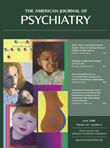Association Between Maternal Smoking and Increased Symptom Severity in Tourette’s Syndrome
Abstract
Objective: Substantial evidence suggests that both environmental and genetic factors contribute to the development and clinical expression of Tourette’s syndrome. Although genetic studies of Tourette’s syndrome are common, studies of environmental factors are relatively few and have not identified consistent risk factors across studies. This study examines in a large cohort of subjects (N=180) the relationship between prenatal/perinatal adverse events with Tourette’s syndrome severity as determined by tic severity and rates of commonly comorbid disorders such as obsessive-compulsive disorder (OCD), attention deficit hyperactivity disorder (ADHD), and self-injurious behavior. Method: Tic severity, OCD, ADHD, self-injurious behavior, and exposure to a variety of prenatal/perinatal events were systematically assessed in all subjects enrolled in three genetic studies of Tourette’s syndrome. Using linear and logistic regression, a best-fit model was determined for each outcome of interest. Results: Prenatal maternal smoking was strongly correlated with increased tic severity and with the presence of comorbid OCD in these Tourette’s syndrome subjects. Other variables, such as paternal age and subject’s birth weight, were significantly but less strongly associated with increased symptom severity. The authors found no association between symptom severity and hypoxia, forceps delivery, or hyperemesis during pregnancy, which have been previously identified as risk factors. Conclusions: This study identifies prenatal maternal smoking as a strong risk factor for increased symptom severity in Tourette’s syndrome.



